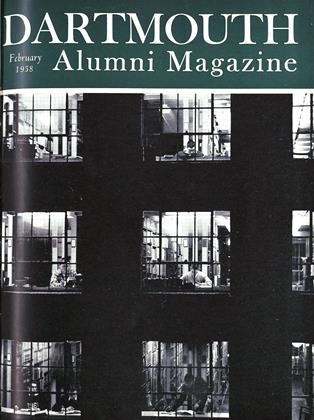WILLIAM O. DOUGLAS is one of the most literate members of the Supreme Court of the United States. He is also a man of conviction. In these days to believe in the Bill of Rights is either to be a national tionalhero or an enemy of society, depending on the point of view.
In his latest book, The Right of thePeople, Doublcday (a substantial part of the North Lectures delivered at Franklin and Marshall College in the spring of 1957), he takes an uncompromising stand for the rights granted every American in our constitution. "My thesis is," he writes, "that there is no free speech in the full meaning of the term unless there is freedom to challenge the very postulates on which the existing regime rests." This thinking is Jeffersonian and was practically treason in the McCarthy age. It is less so today but still Mr. Douglas' ideas will be dimly viewed by those who still confuse dissent with treason and who even regard honest criticism as treachery.
In Part I Mr. Douglas discusses the phi- losophy of the First Amendment, the conflict between free expression and other community values, and censorship and prior restraint. I found the whole book wonderfully straightforward and honest. In Part II he discusses "the right to be let alone," under such topical headings as the Right of Privacy, Legislative Investigations, the Despised Oaths, Religious Freedom, the Dignity of Man, and the Right to Defy an Unconstitutional Statute. In Part III he warns against the encroachment of the military in civilian affairs. With the military now dictating the size of our budget, this becomes most pertinent. The Right of the People is full of warnings to all Americans who are intelligent and who love their country even more than professional politicians and rabble rousers. I equate these deliberately.
Quentin Reynolds, a professional reporter of some distinction, has written a rousing book about the fliers of the First World War called: They Fought for theSky (Rhinehart, 1957). Here you will find the record of the Lafayette Flying Corps: the fabulous deeds of Rickenbacker, Billy Bishop (great Canadian ace), Richtofen, Billy Mitchell, "Micky" Mannock, Nungesser, Fokker, Guynemer, the Arizona hero, Frank Luke, Max Immelmann, Boelcke, Raoul Lufberry ("There won't be any 'after the war' for a fighting pilot"), Norman Prince, Kiffin Rockwell, Bert Hall, etc. There was almost a quality of chivalry in the first war; less in the second. The third war may find only automatic pilots fending off storms of intercontinental missiles. Thanks to Ranald P. Hobbs '30 for this.
Wid Washburn '48 has written the definitive history of Bacon's Rebellion in Virginia, The Governor and the Rebel. published recently by the University Of North Carolina Press. See other columns for a full-length review. This book represents many years of work and is the doctoral dissertation at its best.
Alistair Maclean's third novel (his first was the tense H. M. S. Ulysses) is South byJava Head (Doubleday). It tells of the fall of Singapore, the commandeering of the last ship out of this dead city, and the experiences of a strange group of refugees. The story is excitingly told and those who like adventure stories will find this relatively enthralling. The book will also tend to remind us of the gentle ways of our former enemies, the Japanese.
Tom Beers '34 once again sent me for Christmas the latest Lakeside Press book (given to their friends by R. R. Donnelley & sons). Uncle Dick Wootton deals with "the pioneer frontiersman of the Rocky Mountain Region." The book is well illustrated and handsomely printed. This is the 55th volume of the Lakeside Classics and worthy to be placed beside Gillett, Brush, Carson, Pattie, etc. I really enjoy these early Western classics.
Bertrand Russell, one of the most representative thinkers in this age of "atheistic communism," may be read by all toughminded men with pleasure and profit in his latest book, Why I Am Not a Christian, published by Simon and Schuster. It contains a fine essay on Thomas Paine, Russell's well-known "A Free Man's Worship," "Freedom and the Colleges," the title essay, and eleven others.
I think this book makes much clearer the strange paradoxes of our age. They are such that we cannot afford to ignore their existence; indeed we should make every effort to understand them.
 View Full Issue
View Full Issue
More From This Issue
-
 Feature
FeatureWhat Makes a College New?
February 1958 By BANCROFT H. BROWN, B. P., JOHN. NASH '60 -
 Feature
FeaturePsychology at Dartmouth
February 1958 By CHARLES LEONARD STONE '17 -
 Feature
FeatureFastest Man on Skis
February 1958 By BOB ALLEN '45 -
 Feature
FeatureRegional Leaders Named for Campaign
February 1958 -
 Class Notes
Class Notes1918
February 1958 By ERNEST H. EARLEY, W. CURTIS GLOVER, RICHARD P. WHITE -
 Class Notes
Class Notes1936
February 1958 By JOHN A. SAWYER, FRANK T. WESTON
HERBERT F. WEST '22
-
 Article
ArticleHANOVER BROWSING
February 1936 By Herbert F. West '22 -
 Article
ArticleHanover Browsing
June 1939 By HERBERT F. WEST '22 -
 Article
ArticleHanover Browsing
December 1945 By HERBERT F. WEST '22 -
 Books
BooksDEVIL BY THE TAIL
May 1947 By Herbert F. West '22 -
 Article
ArticleHanover Browsing
January 1950 By HERBERT F. WEST '22 -
 Article
ArticleHanover Browsing
April 1953 By HERBERT F. WEST '22
Article
-
 Article
ArticleDartmouth will welcome the Secretaries on March 14 and 15.
-
 Article
ArticleDirectory of Alumni Associations and Classes
DECEMBER 1931 -
 Article
ArticleZero As An Answer
May 1981 -
 Article
ArticleGive a Rouse for
MARCH 1983 -
 Article
Article"In Hanover they called him the Big Green Train and his athletic achievements are still the stuff of legend."
NOVEMBER • 1987 By David Shribman '76 in 100 Years of Dartmouth Football -
 Article
ArticleThayer School
NOVEMBER 1969 By RUSS STEARNS '38


